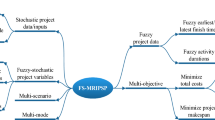Abstract
In the present paper, a novel solution approach is proposed for a class of fuzzy programming models. In this direction, we prove that the lower and upper bounds of their fuzzy optimal objective values at a possibility level, \(\alpha \in [0,1]\), can be calculated solving a pair of crisp mathematical programming models. Thus, their membership functions are simulated enumerating the upper and lower bounds obtained from a series of \(\alpha\)-level calculations. Motivated from real-world project scheduling applications, several numerical examples are considered to evaluate the accuracy, efficiency and applicability of our treatment. The results derived are compared with those of Chen and Tsai (Eur J Oper Res 212(2):386–397, 2011) to demonstrate that our method is easier to be utilized, with lower computational complexity, nonetheless without losing its effectiveness. Finally, the new approach does not suffer from the limitation to be applicable only to linear programming models that makes it suitable for a wider range of models and applications.





Similar content being viewed by others
References
Su, T.S., Lin, Y.F.: Fuzzy multi-objective procurement/production planning decision problems for recoverable manufacturing systems. J. Manuf. Syst. 37(1), 396–408 (2015)
Chen, S.P., Tsai, M.J.: Time-cost trade-off analysis of project networks in fuzzy environments. Eur. J. Oper. Res. 212(2), 386–397 (2011)
Wang, R., Zhou, J., Yi, X., Pantelous, A.A.: Solving the green-fuzzy vehicle routing problem using a revised hybrid intelligent algorithm. J. Ambient Intell. Humaniz. Comput. (2018). https://doi.org/10.1007/s12652-018-0703-9
Verdegay, J.L.: Progress on fuzzy mathematical programming: a personal perspective. Fuzzy Sets Syst. 281, 219–226 (2015)
Zimmermann, H.J.: Description and optimization of fuzzy systems. Int. J. Gen. Syst. 2(1), 209–215 (1975)
Chanas, S.: Fuzzy programming in multiobjective linear programming: a parametric approach. Fuzzy Sets Syst. 29(3), 303–313 (1989)
Sinha, S.: Fuzzy mathematical programming applied to multi-level programming problems. Comput. Oper. Res. 30(9), 1259–1268 (2003)
Tanaka, H., Asai, K.: Fuzzy linear programming problems with fuzzy numbers. Fuzzy Sets Syst. 13(1), 1–10 (1984)
Buckley, J.J., Feuring, T.: Evolutionary algorithm solution to fuzzy problems: fuzzy linear programming. Fuzzy Sets Syst. 109(1), 35–53 (2000)
Zhou, J., Yang, F., Wang, K.: Fuzzy arithmetic on LR fuzzy numbers with applications to fuzzy programming. J. Intell. Fuzzy Syst. 30(1), 71–87 (2016)
Dubois, D., Prade, H.: Operations on fuzzy numbers. Int. J. Syst. Sci. 9(6), 613–626 (1978)
Yager, R.R.: On the specificity of a possibility distribution. Fuzzy Sets Syst. 50(3), 279–292 (1992)
Eslamipoor, R., Haji, M.J., Sepehriar, A.: Proposing a revised method for ranking fuzzy numbers. J. Intell. Fuzzy Syst. 25(2), 373–378 (2013)
Baykasoglu, A., Gocken, T.: A direct solution approach to fuzzy mathematical programs with fuzzy decision variables. Expert Syst. Appl. 39(2), 1972–1978 (2012)
Hatami, A., Kazemipoor, H.: Solving fully fuzzy linear programming with symmetric trapezoidal fuzzy numbers using Mehar’s method. J. Math. Comput. Sci. 4(2), 463–470 (2014)
Kaur, J., Kumar, A.: Mehar’s method for solving fully fuzzy linear programming problems with LR fuzzy parameters. Appl. Math. Model. 37(12–13), 7142–7153 (2013)
Pishvaee, M.S., Torabi, S.A.: A possibilistic programming approach for closed-loop supply chain network design under uncertainty. Fuzzy Sets Syst. 161(20), 2668–2683 (2010)
Ozceylan, E., Paksoy, T.: Interactive fuzzy programming approaches to the strategic and tactical planning of a closed-loop supply chain under uncertainty. Int. J. Prod. Res. 52(8), 2363–2387 (2014)
Talaei, M., Moghaddam, B.F., Pishvaee, M.S., Bozorgi-Amiri, A., Gholamnejad, S.: A robust fuzzy optimization model for carbon-efficient closed-loop supply chain network design problem: a numerical illustration in electronics industry. J. Clean. Prod. 113, 662–673 (2016)
Farrokh, M., Azar, A., Jandaghi, G., Ahmadi, E.: A novel robust fuzzy stochastic programming for closed loop supply chain network design under hybrid uncertainty. Fuzzy Sets Syst. 341, 69–91 (2017)
Chen, S.P., Ho, Y.H.: Optimal inventory policy for the fuzzy newsboy problem with quantity discounts. Inf. Sci. 228, 75–89 (2013)
Chen, S.P.: Effects of fuzzy data on decision making in a competitive supply chain. J. Oper. Res. Soc. 68(10), 1146–1160 (2017)
Zadeh, L.A.: The concept of linguistic variable and its application to approximate reasoning. Inf. Sci. 8(3), 199–249 (1975)
Aminbakhsh, S., Sonmez, R.: Discrete particle swarm optimization method for the large-scale discrete time-cost trade-off problem. Expert Syst. Appl. 51, 177–185 (2016)
Zou, X., Fang, S.C., Huang, Y.S., Zhang, L.H.: Mixed-integer linear programming approach for scheduling repetitive projects with time-cost trade-off consideration. J. Comput. Civil. Eng. 31(3), 06016003 (2017)
Hu, X., Cui, N., Demeulemeester, E.: Effective expediting to improve project due date and cost performance through buffer management. Int. J. Prod. Res. 53(5), 1460–1471 (2015)
Prade, H.: Using fuzzy set theory in a scheduling problem: a case study. Fuzzy Sets Syst. 2(2), 153–165 (1979)
Pathak, B.K., Srivastava, S.: Integrated fuzzy-HMH for project uncertainties in time-cost trade-off problem. Appl. Soft. Comput. 21, 320–329 (2014)
Vartouni, A.M., Khanli, L.M.: A hybrid genetic algorithm and fuzzy set applied to multi-mode resource-constrained project scheduling problem. J. Intell. Fuzzy Syst. 26(3), 1103–1112 (2014)
Ke, H., Ma, J.: Modeling project time-cost trade-off in fuzzy random environment. Appl. Soft. Comput. 19, 80–85 (2014)
Zadeh, L.A.: Fuzzy sets. Inf. Control 8(3), 338–353 (1965)
Cheng, C.H.: A new approach for ranking fuzzy numbers by distance method. Fuzzy Sets Syst. 95(3), 307–317 (1998)
Zadeh, L.A.: Fuzzy sets as a basis for a theory of possibility. Fuzzy Sets Syst. 100(1), 9–34 (1999)
Nahmias, S.: Fuzzy variables. Fuzzy Sets Syst. 1(2), 97–110 (1978)
Liu, B.: Uncertainty Theory. Springer, Berlin (2004)
Baykasoglu, A., Gocken, T.: A review and classification of fuzzy mathematical programs. J. Intell. Fuzzy Syst. 19(3), 205–229 (2008)
Zhong, S., Pantelous, A.A., Beer, M., Zhou, J.: Constrained non-linear multi-objective optimization of preventive maintenance scheduling for offshore wind farms. Mech. Syst. Signal Process. 104, 347–369 (2018)
Kaufmann, A., Gupta, M.M.: Introduction to Fuzzy Arithmetic: Theory and Applications. Thomson, Belmont (1991)
Acknowledgements
The authors would like to acknowledge the gracious support of this work by the National Natural Science Foundation of China (Grant No. 71501123) and the High-end Foreign Experts Recruitment Program of China (Grant No. GDW20183100431).
Author information
Authors and Affiliations
Corresponding author
Appendix
Appendix
Rights and permissions
About this article
Cite this article
Zhang, Q., Zhou, J., Wang, K. et al. An Effective Solution Approach to Fuzzy Programming with Application to Project Scheduling. Int. J. Fuzzy Syst. 20, 2383–2398 (2018). https://doi.org/10.1007/s40815-018-0542-z
Received:
Revised:
Accepted:
Published:
Issue Date:
DOI: https://doi.org/10.1007/s40815-018-0542-z




